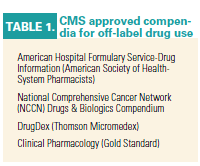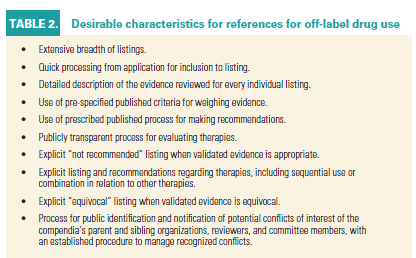Medicare expands options for use of off-label drugs
In the first of what will become an annual review process, the nation’s largest cancer-care payer has added three new formularies to its drug coverage policy, giving oncologists even greater ability to prescribe off -label cancer drugs.
ABSTRACT: Coverage parameters triple as Centers for Medicare & Medicaid Servicessanctions three more compendia as acceptable for off-label use. Criticssay that more choices may not lead to the best decision-making.
In the first of what will become an annual review process, the nation’s largest cancer-care payer has added three new formularies to its drug coverage policy, giving oncologists even greater ability to prescribe off -label cancer drugs.
Compendia changes are significant because at least 50% of all cancer treatments are off -label. Moreover, Medicare coverage decisions affect the behavior of private payers who frequently follow Centers for Medicare & Medicaid Services’ lead in crafting their own coverage policies.
“Th e expanded number of compendia by Medicare is welcome and provides evidence- based recommendations for cancer care,” said Joseph S. Bailes, MD, liaison for ASCO’s government relations council (see Table 1).

However, health economists worry that broadening coverage parameters will add to the dramatically rising costs of Medicare spending on Part B drugs, a category dominated by cancer drugs.
“The U.S. market appears to be able to tolerate virtually any price for the smallest of benefits, largely because everyone is paying with third-party dollars and because the pricing system is set up to reward doctors financially for using the most expensive therapies,” said Leonard Saltz, MD, professor of medicine at The New York Hospital- Cornell Medical Center and an attending physician at Memorial Sloan-Kettering Cancer Center, both in New York.
Fifteen-year struggle
Advocacy for expanded use of off-label drugs began 15 years ago when ASCO petitioned for passage of the 1993 Omnibus Budget Reconciliation Act requirement. Th e latter mandated that Medicare provide coverage for off -label cancer drugs if their use is supported by designated compendia.
Prior to the 1993 statute, Medicare did not cover drugs unless they were on FDA labeling for a specific indication, even if clinical trials had found them effective, Dr. Bailes told Oncology News International. “We spent a lot of time and energy to make sure people got access to cancer drugs that otherwise wouldn’t have been available,” he said.
Th e 1993 statute listed three compendia and gave the U.S. Department of Health and Human Services (HHS) authority to update the list. Since the statute was passed, only one of the original compendia, the American Hospital Formulary Service- Drug Information (AHFS-DI), is still in publication. Concerned that limiting coverage to a single compendium might constrain access to off -label drugs, ASCO and other groups lobbied CMS to recognize additional sources.
In March 2007, CMS convened its Medicare Evidence Development and Coverage Advisory Committee (MedCAC) to develop “desirable characteristics” for the regular inclusion of additional compendia (see Table 2). By 2008, CMS had added three new compendia to its list of designated review publications: the National Comprehensive Cancer Network Drugs & Biologics Compendium, DrugDex, and Clinical Pharmacology.
Now Medicare is obliged to cover any off -label cancer therapy if its use is supported in one compendium, as long as none of the others advise against it. However, if off -label use is not included in one of the designated compendia, Medicare contractors are also permitted to rely on peer-reviewed research published in one of 26 specified journals. In an effort to maintain a transparent and up-to-date review system, Medicare evaluates requests for compendia changes each year between January 15th and February 15th.
The CMS action has garnered plaudits not only from major cancer organizations but also from watch-dog groups like Accelerate Progress, who view FDA’s ultraconservative drug approval process as a barrier to cancer care for desperately ill people, according to Scott Riccio, Accelerate Progress executive director.

Mr. Riccio told Oncology News International that “we believe that expanding the meaningful and effective use of off -label drugs is driven, in part, by appropriate reimbursement from CMS. Appropriate off -label use of cancer drugs will be fostered by more, not less, communication of clear actionable information.”
The slippery slope
The compendia issue is not without its critics, some of whom contend that listings of off -label indications in drug compendia affect not only reimbursement decisions, but also utilization.
Neal J. Meropol, MD, director of the Gastrointestinal Cancer Program at Fox Chase Cancer Center in Philadelphia, has published several papers on the implications of drug utilization and costs.

“The reality is that much of what oncologists consider as standard care has not yet been approved for specific indications by the lengthy and expensive FDA labeling process,” he told Oncology News International. “That said, there’s no question that there’s a risk that liberal reimbursement policies may influence the utilization patterns of oncologists.”
Discordant recommendations
In order to better inform potential future coverage decisions, CMS commissioned a technology assessment study from the Agency for Healthcare Research and Quality (AHRQ). The study’s lead author was Amy P. Abernethy, MD, program director of the Duke Cancer Care Research Program at Duke University School of Medicine in Durham, N.C.
Six compendia were evaluated to determine how closely they adhered to their stated methods concerning evidence based medicine and the potential impact of non-adherence.
Looking at 14 cancer agent combinations that were off -label at the time of the study, the authors found great disparities in the recommendations among the four compendia and the evidence cited to support the recommendations.
The use of bevacizumab (Avastin) in breast cancer is one example: The NCCN compendium recommends it while DrugDex advises against its use and neither AHFS-DI nor Clinical Pharmacology mentions bevacizumab for breast cancer treatment (AHRQ Technology Assessment Program: “Compendia for coverage of off-label uses of drugs and biologics in an anticancer chemotherapy regimen: Final report,” May 7, 2007).

“To that end, the most observable outcome was that, in many cases, the compendia were not doing what they said they were doing. Considering all of the available information, the most obvious example of that was not adhering to updating cycles,” Dr. Abernethy said.
These discordant recommendations on the same off -label drug most likely had to do with how the information was interpreted as well as the cycle of updates. “We found over and over that there were different lag-times in the way that the six compendia identified and processed information,” she explained.
Bolstering patient care
The clinical information that needs to be interpolated into the decision-making process is comprehensive and constantly changing. Dr. Abernethy stressed that in their AHRQ report, she and her coauthors were not judging the current information in the compendia, but based their analysis on information available in 2006.
The most obvious advantage to the expanded 2008 list of compendia is a greater breadth of data. “The risk of not having adequate variation in review resources is that you don’t have enough information overlap to fill holes in the decision-making process,” Dr. Abernethy said. “By having greater distribution of the task of evidence synthesis across a greater number of compendia, there might actually be a beneficial result that reaches down into patient care.”
Peter Yu, MD, agreed that giving physician’s the leeway to choose the right drugs is important. Dr. Yu serves as the representative for community oncology on the ASCO board of directors.
“It is likely that the upcoming years will see more stringent and uniform criteria for how these compendia review and select off-label oncology drug indications,” Dr Yu said. “At this time, the four chosen compendia provide oncologists with the necessary latitude when making treatment choices for their patients.

Obviously, meriting an indication does not mean that a drug is the best choice for every patient who fits that indication, but it does allow the physician and patient to select the best drug available for that particular patient.”
In an eff ort to continue to fill some of those holes in the decision-making process, the American Society of Health-System Pharmacists has recommended that CMS bolster the MedCAC list of “desirable characteristics” by adding requirements such as independence from manufacturing entities and evidence-based objectivity.
“If the compendia standards are not adequately maintained and the bar becomes set too low, then CMS will necessarily reconsider its position,” Dr. Saltz said.
“The compendia are a privilege. The cancer community must not abuse that privilege or we will lose it.”